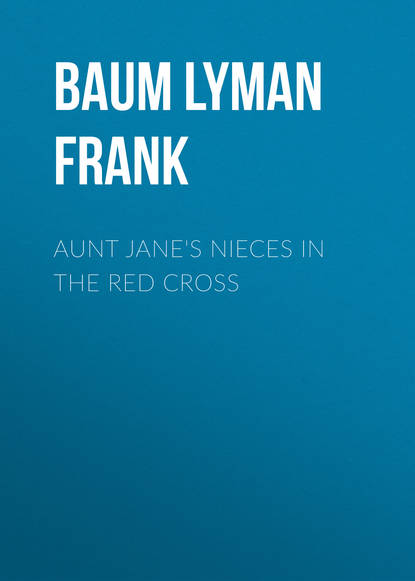По всем вопросам обращайтесь на: info@litportal.ru
(©) 2003-2025.
✖
Aunt Jane's Nieces in the Red Cross
Настройки чтения
Размер шрифта
Высота строк
Поля
It was on Sunday, the twentieth of December, that the Battle of the Dunes began and the flames of war burst out afresh. The dunes lay between the North Sea and the Yser River in West Flanders and consisted of a stretch of sandy hillocks reaching from Coxyde to Nieuport les Bains. The Belgians had entrenched these dunes in an elaborate and clever manner, shoveling the sand into a series of high lateral ridges, with alternate hollows, which reached for miles along the coast. The hollows were from six to eight feet deep, affording protection to the soldiers, who could nevertheless fire upon the enemy by creeping up the sloping embankments until their heads projected sufficiently to allow them to aim, when they could drop back to safety.
In order to connect the hollows one with another, that an advance or retreat might be made under cover, narrow trenches had been cut at intervals diagonally through the raised mounds of sand. Military experts considered this series of novel fortifications to be practically impregnable, for should the enemy defile through one of the cross passages into a hollow where the Allies were gathered, they could be picked off one by one, as they appeared, and be absolutely annihilated.
Realizing this, the Germans had not risked an attack, but after long study of the defences had decided that by means of artillery they might shell the Belgians, who held the dunes, and destroy them as they lay in the hollows. So a heavy battery had been planted along the German lines for this work, while in defence the Belgians confronted them with their own famous dog artillery, consisting of the deadly machine guns. The battle of December twentieth therefore began with an artillery duel, resulting in so many casualties that the Red Cross workers found themselves fully occupied.
Beth went with the ambulance the first day, worked in the hollows of the dunes, and returned to the ship at night completely worn out by the demands upon her services. It was Patsy's turn next, and she took with her the second day one of the French girls as assistant.
When the ambulance reached the edge of the dunes, where it was driven by Ajo, the battle was raging with even more vigor than the previous day. The Germans were dropping shells promiscuously into the various hollows, hoping to locate the hidden Belgian infantry, while the Belgian artillery strove to destroy the German gunners. Both succeeded at times, and both sides were equally persistent.
As it was impossible to take the ambulance into the dunes, it was left in the rear in charge of Jones, while the others threaded their way in and out the devious passages toward the front. They had covered fully a mile in this laborious fashion before they came upon a detachment of Belgian infantry which was lying in wait for a call to action. Beyond this trench the doctors and nurses were forbidden to go, and the officer in command warned the Americans to beware of stray shells.
Under these circumstances they contented themselves by occupying some of the rear hollows, to which the wounded would retreat to secure their services. Dr. Kelsey and Nanette, the French girl, established themselves in one hollow at the right, while Dr. Gys and Patsy took their position in another hollow further to the left. There they opened their cases of lint, plaster and bandages, spreading them out upon the sand, and were soon engaged in administering aid to an occasional victim of the battle.
One man who came to Patsy with a slight wound on his shoulder told her that a shell had exploded in a forward hollow and killed outright fifteen of his comrades. His own escape from death was miraculous and the poor fellow was so unnerved that he cried like a baby.
They directed him to the rear, where he would find the ambulance, and awaited the appearance of more patients. Gys crawled up the mound of sand in front of them and cautiously raised his head above the ridge. Next instant he ducked to escape a rain of bullets that scattered the sand about them like a mist.
"That was foolish," said Patsy reprovingly. "You might have been killed."
"No such luck," he muttered in reply, but the girl could see that he trembled slightly with nervousness. Neither realized at the time the fatal folly of the act, for they were unaware that the Germans were seeking just such a clew to direct them where to drop their shells.
"It's getting rather lonely here, and there are a couple of vacant hollows in front of us," remarked the doctor. "Suppose we move over to one of those, a little nearer the soldiers?"
Patsy approved the proposition, so they gathered up their supplies and moved along the hollow to where a passage had been cut through. They had gone barely a hundred yards when a screech, like a buzz-saw when it strikes a nail, sounded overhead. Looking up they saw a black disk hurtling through the air, to drop almost where they had been standing a moment before. There was a terrific explosion that sent debris to their very feet.
"After this we'll be careful how we expose ourselves," said the doctor gravely. "They have got our range in a hurry. Here comes another; we'd better get away quickly."
They progressed perhaps half a mile, without coming upon any soldiers, when at the brow of a hill slightly higher than the rest, they became aware of unwonted activity. A trench had been dug along the ridge, with great pits here and there to serve as bomb-proof shelters. Every time a head projected above the ridge, a storm of bullets showed that the enemy was well within rifle range. In fact, it was to dislodge the Germans that the present intrenchments were being made; machine guns would be mounted as soon as positions had been prepared.
The German bullets had already taken their toll. In the little valley a poor Belgian pressed his hand against a bad wound in his side, while another was nursing an arm roughly bandaged by his fellows in the trenches. First aid made the two comfortable for the time being at least and the men were directed toward the ambulance. As they left, the man with the wounded arm pointed down the narrow valley to where a deep ravine cut through. "We were driven from there," he said. "The big guns dropped shells on us and killed many; there are many wounded beyond – but you cannot cross the ravine. We lost ten in doing it."
Nevertheless, the doctor and Patsy strode off. Just within the shelter of the ridge they found another Belgian, desperately wounded, and the doctor stopped to ease his pain with the hypodermic needle. Patsy looked across the narrow defile; it was a bare fifty feet, and seemed safe enough. Her Red Cross uniform would protect her, she reasoned, and boldly enough she stepped out into the open. A cry from a wounded soldier ahead hastened her footsteps. Without heeding the warning shout of Doctor Gys she calmly stooped over the man who had called to her.
And then there was a sudden rending, blinding, terrifying crash that sent the world into a thousand shrieking echoes. A huge shell had fallen not fifty feet away, plowing its way through the earthworks above. Its explosion sent timbers, abandoned gun-carriages, everything, flying through the air. And one great piece of wood caught Patsy a glancing blow on the back of her head as she crouched over the wounded Belgian. With a weak cry she toppled over, not unconscious, but unable to raise herself.
Another shell crashed down a hundred yards away, and then one closer that sent the sand spouting high in a blinding cloud. She raised herself slowly and glanced back toward Doctor Gys. He stood, his face ashen with fear, hiding behind the shelter of the other hill. He looked up as she stirred; a cry of relief came to his lips.
"Wait!" he called, bracing up suddenly. "Wait and I will get you."
Bending his head low he sprang across the unprotected space. He stopped with a sudden jerk and then came on.
"You were hit!" cried Patsy as he bent over her.
"It is nothing," he answered brusquely. "Hold tight around my neck." "Now – " another shell scattered sand over them – "we must get away from here."
Breathing thickly, he staggered across the open, dropping her with a great groan behind the protection of the ridge.
"The man you were helping," he gasped. "I must bring him in."
"But you are wounded – " Patsy cried.
He straightened up – his hand clutched his side – there came across his disfigured features a queer twisted smile – he sighed softly and slowly sank in a crumpled heap. A clean little puncture in the breast of his coat told the whole story. Patsy felt herself slipping… All grew dark.
It was Ajo who found her and carried her back to the ambulance, where Dr. Kelsey and Nanette were presently able to restore her to consciousness. Then they returned to the Arabella, grave and silent, and Patsy was put to bed. Before morning Beth and Maud were anxiously nursing her, for she had developed a high fever and was delirious.
The days that succeed were anxious ones, for Patsy's nerves had given away completely. It was many weeks later that the rest of them met on deck.
"It's the first of February," said Uncle John. "Don't you suppose Patsy could start for home pretty soon?"
"Perhaps so," answered Maud. "She is sitting up to-day, and seems brighter and more like herself. Have we decided, then, to return to America?"
"I believe so," was the reply. "We can't keep Ajo's ship forever, you know, and without Doctor Gys we could never make it useful as a hospital ship again."
"That is true," said the girl, thoughtfully. "Now that Andrew Denton, with his wife and the countess, have gone to Charleroi, our ship seems quite lonely."
"You see," said Ajo, taking part in the discussion, "we've never been able to overcome the suspicious coldness of these Frenchmen, caused by Elbl's unfortunate escape. We are not trusted fully, and never will be again, so I'm convinced our career of usefulness here is ended."
"Aside from that," returned Uncle John, "you three girls have endured a long period of hard work and nervous strain, and you need a rest. I'm awfully proud of you all; proud of your noble determination and courage as well as the ability you have demonstrated as nurses. You have unselfishly devoted your lives for three strenuous months to the injured soldiers of a foreign war, and I hope you're satisfied that you've done your full duty."
"Well," returned Maud with a smile, "I wouldn't think of retreating if I felt that our services were really needed, but there are so many women coming here for Red Cross work – English, French, Swiss, Dutch and Italian – that they seem able to cover the field thoroughly."
"True," said Beth, joining the group. "Let's go home, Uncle. The voyage will put our Patsy in fine shape again. When can we start, Ajo?"
"Ask Uncle John."
"Ask Captain Carg."
"If you really mean it," said the captain, "I'll hoist anchor to-morrow morning."

















